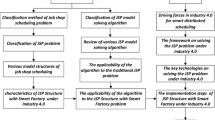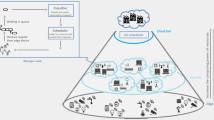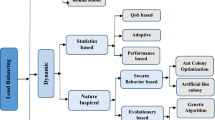Abstract
With the development of new generation information technology, many traditional factories begin to transform to smart factories. How to process the huge volume data in the smart factories so as to improve the production efficiency is still a serious problem. Based on the characteristics of smart factory, a fog computing framework suitable for smart factory is proposed, and Kubernetes is used to automatically deploy containerized smart factory applications. First, in the scene of fog computing, an improved interval division genetic scheduling algorithm IDGSA (Interval Division Genetic Scheduling Algorithm) based on genetic algorithm is proposed to schedule and allocate tasks in smart factory. We consider the optimization of task execution time and resource balance at same time and combined with IDGSA, the optimized scheduling decision is given. Second, we further design an architecture of cloud and fog collaborative computing. In this scenario, we propose the IDGSA-P (Interval Division Genetic Scheduling Algorithm with Penalty factor) for optimization based on IDGSA. Finally, we carry out simulation experiments to verify the performance of the proposed algorithms. The simulation results show that compared with Kubernetes default scheduling algorithm, IDGSA can reduce data processing time by 50% and improve the utilization of fog computing resources by 60%. Compared with traditional genetic algorithm, with fewer iterations, IDGSA can reduce data processing time by 7% and improve the utilization of fog computing resources by 9%. And compared with the conventional Joines&Houck method, the proposed IDGSA-P algorithm can converge much faster and archived better optimization results. Further, the simulation shows that IDGSA-P in cloud and fog collaborative computing can reduce the total task delay by 18% and 7%, respectively, when compare to only-cloud and only-fog computing.









Similar content being viewed by others
References
Chen, N., Yang, Y., Zhang, T., Zhou, M. T., Luo, X., & Zao, J. K. (2018) Fog as a service technology. IEEE Commun Mag, pp 1–7
Chiang M, Tao Z (2017) Fog and IoT an overview of research opportunities. IEEE Internet of Things J 3(6):854–864
Deng R et al (2017) Optimal workload allocation in fog-cloud computing toward balanced delay and power consumption. IEEE Internet of Things J 3.6:1171–1181
Faragardi, H. R., et al. (2018) A time-predictable fog-integrated cloud framework: one step forward in the deployment of a smart factory. Rtest
Fazio M, Celesti A, Ranjan R, Chang L, Chen L, Villari M (2016) Open issues in scheduling microservices in the cloud. IEEE Cloud Comput 3(5):81–88
Gazis, V., Leonardi, A., Mathioudakis, K., Sasloglou, K., & Sudhaakar, R. (2015) Components of fog computing in an industrial internet of things context. 2015 12th Annual IEEE international conference on sensing, communication, and networking – workshops (SECON Workshops). IEEE
Gedawy, H., et al. (2018) An energy-aware IoT femtocloud system. 58–65
Gribaudo M, Iacono M, Manini D (2018) Performance evaluation of replication policies in microservice based architectures. Electron Notes Theor Comput Sci 337:45–65
Ha, J., Kim, J., Park, H., Lee, J., & Jang, J. (2017) A web-based service deployment method to edge devices in smart factory exploiting Docker. International Conference on Information & Communication Technology Convergence. IEEE
Joines, J. A., and C. R. Houck (1994) On the use of non-stationary penalty functions to solve nonlinear constrained optimization problems with GA’s. IEEE Conference on Evolutionary Computation, IEEE World Congress on Computational Intelligence IEEE
Liu, Z., et al. (2018) DATS: dispersive stable task scheduling in heterogeneous fog networks. IEEE Internet of Things J. 1–1
Mourtzis D, Vlachou E, Milas N (2016) Industrial big data as a result of IoT adoption in manufacturing. Procedia CIRP 55:290–295
Production-Grade Container Orchestration (2017) https://kubernetes.io/. (2017). Google
Skarlat, O., et al. (2016) Resource provisioning for IoT services in the fog. IEEE International Conference on Service-oriented Computing & Applications IEEE
Tayeb, S., S. Latifi, and Y. Kim (2017) A survey on IoT communication and computation frameworks: an industrial perspective. Computing & Communication Workshop & Conference IEEE
Tihfon GM, Park S, Kim J, Kim YM (2016) An efficient multi-task PaaS cloud infrastructure based on docker and access for application deployment. Clust Comput 19(3):1–13
Verma, S., et al. (2016) An efficient data replication and load balancing technique for fog computing environment. International Conference on Computing for Sustainable Global Development IEEE
Wan, J., et al. (2018) Fog computing for energy-aware load balancing and scheduling in smart factory. Industrial Informatics, IEEE Transactions on 14.10. 4548–4556
Wang, W., et al. (2015) Multiple resources scheduling for diverse workloads in heterogeneous datacenter. 2015 4th International Conference on Computer Science and Network Technology (ICCSNT) IEEE
Weaveworks, ContainerSolutions: Socks shop – a microservices demo application (2016). https://microservices-demo. github.io/
Y. Yang, Luo, X, Chu, X., & Zhou, M. T. (2020). Fog-enabled intelligent IoT systems
Author information
Authors and Affiliations
Corresponding author
Additional information
Publisher’s note
Springer Nature remains neutral with regard to jurisdictional claims in published maps and institutional affiliations.
This work was supported by the STCSM Science and Technology Innovation Program on Hightech under Grant No. 18511106500.
Rights and permissions
About this article
Cite this article
Zhou, MT., Ren, TF., Dai, ZM. et al. Task Scheduling and Resource Balancing of Fog Computing in Smart Factory. Mobile Netw Appl 28, 19–30 (2023). https://doi.org/10.1007/s11036-022-01992-w
Accepted:
Published:
Issue Date:
DOI: https://doi.org/10.1007/s11036-022-01992-w




